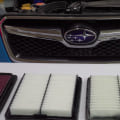The most obvious sign that your air filter needs to be replaced is a decrease in gas consumption. If you notice black smoke or flames coming from the exhaust pipe, it's time to take a look at the filter. A clean, fresh filter will be mostly white in color, but it will darken as dust and dirt accumulate. If the filter looks very dark and dirty, it's likely time for a change.
If you're not sure, you can always ask a technician to check the filters for you. So you've experienced some of the other symptoms of a clogged air filter from our list. Take a look at the real part. New filters are usually white, cream, or whitish-gray.
You won't be able to ignore the dirt on the outside if the part is very clogged and needs to be replaced. However, sometimes, there can be a significant accumulation of dirt on the filter paper, requiring a real mechanic to check the part to confirm that it is not working at the required level. Don't underestimate the power of a new air filter - the vitality of your car depends on it. Most user manuals recommend changing the air filter every 12,000 to 15,000 miles. You can have the technician at your tire shop do the work while spinning your tires and keep your care working at its best.
No car is exempt from the potential damage caused by a dirty air filter - do yourself (and your car) a favor and be sure to replace this key component of the air intake system regularly. Most car companies suggest changing your air filter every 10,000 to 15,000 miles or every 12 months. However, if you tend to drive in dusty or rural areas such as Scottsdale (Arizona) or San Antonio (Texas), you may want to have your mechanic check and change it more often - for example every 6,000 miles. Driving in busy areas where there is a lot of traffic such as Los Angeles and Washington DC also requires you to replace the air filter more often. Most vehicles also have a cabin air filter that is used to clean the air that enters the interior of the car, but it has a different maintenance schedule than the engine air filter. So after 10 to 15 thousand miles, you'll have to replace the air filter (or sooner if you drive and live in very dusty areas).Engine air filters prevent harmful waste from damaging components crucial to keeping the car running smoothly.
However, very often, the inner layers of filter paper inside the air filter can contain dust and dirt that are not visible even in bright light. At the same time, the air filter must allow enough air to reach the engine so that it can work effectively. A dirty filter can restrict airflow to the engine, and if the engine doesn't have enough air to run, it compensates by burning additional fuel. In engines, it is supplied by gasoline, diesel or other fuel source, spark plugs, and air passes through the air filter ensuring that dirt and mud do not enter piston chambers. If you notice that your car is vibrating excessively or you hear coughing or clicking noises when idling, it's often due to a clogged air filter that dirties or damages spark plugs. Newer cars with fuel-injected engines use on-board computers to calculate amount of air entering engine and adjust fuel flow accordingly. If any of these signs are present - decreased gas consumption; black smoke or flames from exhaust pipe; dark and dirty looking filters; splash or clicking sounds when engine is idling; vibrating excessively; coughing or clicking noises - it's time for an inspection and possibly replacement of your car's air filter. Do yourself (and your car) a favor and be sure to replace this key component of the air intake system regularly.
Most car companies recommend changing your air filter every 10,000 to 15,000 miles or every 12 months. However, if you tend to drive in dusty or rural areas such as Scottsdale (Arizona) or San Antonio (Texas), you may want to have your mechanic check and change it more often - for example every 6,000 miles.



